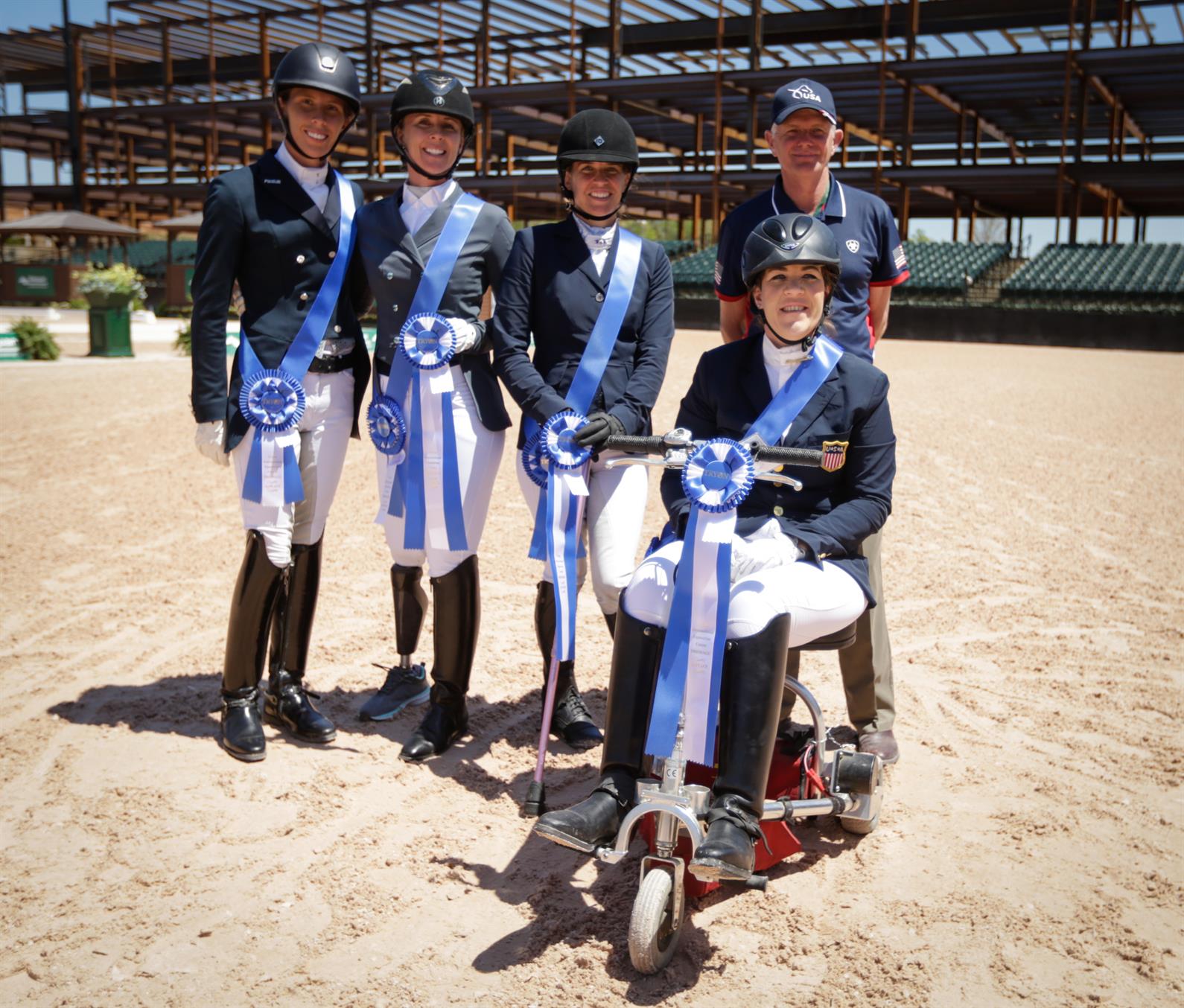
Mill Spring, N.C. - The U.S. Para-Equestrian Dressage Team presented by Deloitte added another victory to their resume this week at the FEI World Equestrian Games (WEG) Tryon Para-Dressage Test Event CPEDI3*, April 20-22. The U.S. team of Rebecca Hart (Wellington, Fla.), Katie Jackson (Austin, Texas), Kate Shoemaker (Peoria, Ariz.), and Roxanne Trunnell (Rowlett, Texas) was led by Chef d’Equipe Kai Handt and assisted by USEF Head of Para-Equestrian Coach Development and High Performance Consultant, Michel Assouline.
The team competed in two tests – the FEI Individual Test for all grades on Friday and the FEI Team Test for all grades on Saturday – which each counted 50% toward the overall team score. The U.S. Para-Equestrian Dressage Team presented by Deloitte won with a total team score of 429.096 percent over Canada who scored 400.246 percent.
With three new combinations, the U.S. team tested out the facility and venue in preparation for the WEG, while giving these combinations a chance to test their horses and abilities in a team environment.
“We have been monitoring these [new] combinations over the last couple of months,” said Handt. “They have been doing really well, and it turned out to be excellent. We took the risk and put three new combinations on the team and they did excellent yesterday and very good today – so we picked the right horses for the team. They performed as anticipated by the selectors and did a really good job.”
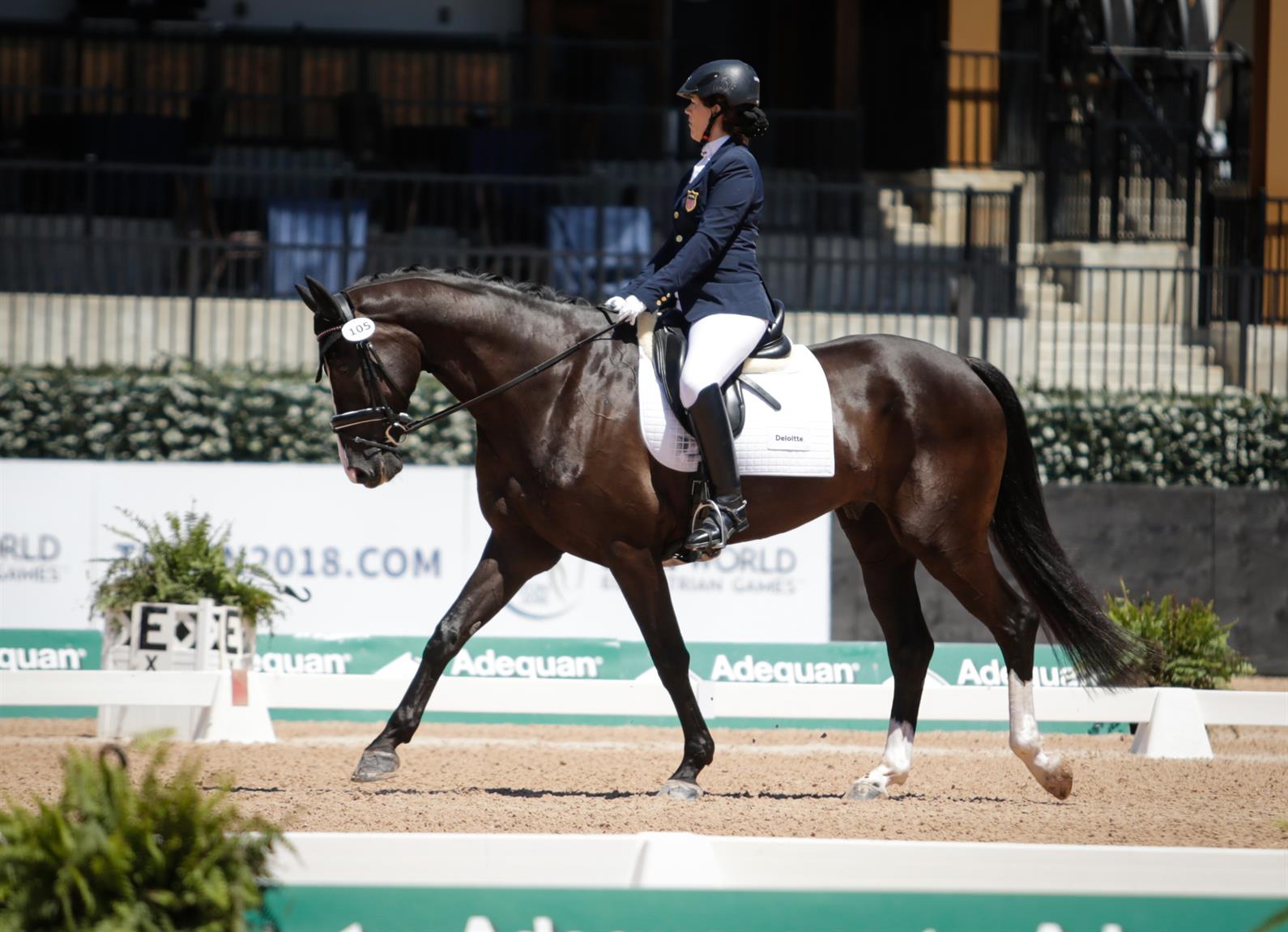
Trunnell and Dolton, Shoemaker’s six-year-old Hanoverian gelding, were the first in the ring for the U.S. team in Friday’s Grade I FEI Individual Test. Their first time down the centerline, the duo pulled out a big score of 73.155 percent.
“[Dolton] is very sweet,” said Trunnell. “I am not yet used to having a gelding, but we are bonding. He is a very good horse.”
Brought together by the result of a fellow para-athlete and owner, Shoemaker, and the support of a generous sponsor, Karin Flint, Trunnell and Dolton are the product of insight and belief in the para-dressage program.
“I knew when I came into the program that I had to find a top Grade I horse,” said Assouline. “When I saw Kate [Shoemaker] last winter, she offered the horse and I said, ‘That is going to be a horse for [Roxanne Trunnell].’ We are lucky enough to have the support of Karin Flint. She is the one that made this possible. It is a collective project.”
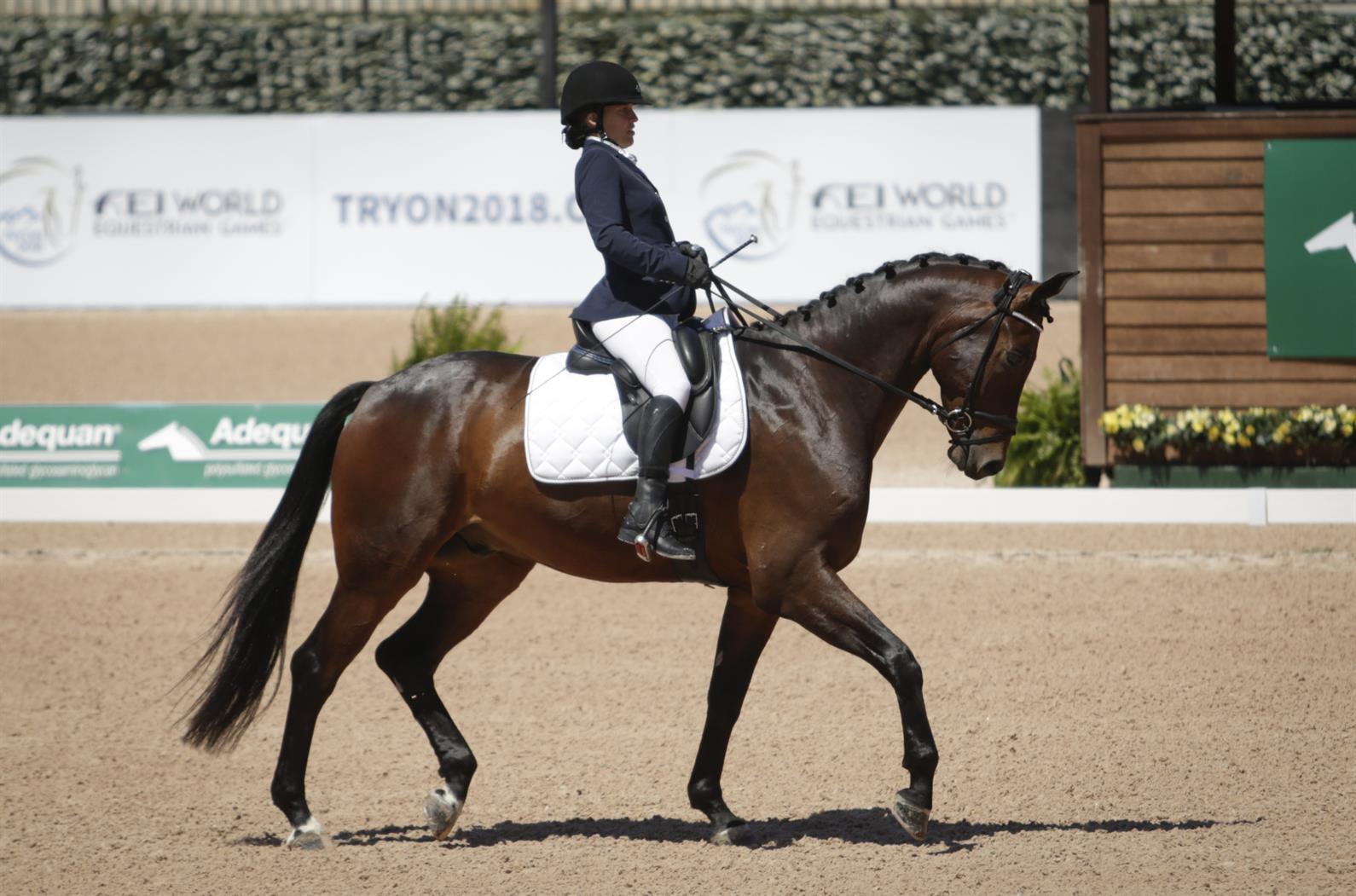
Hart and Fortune 500, an eight-year-old Oldenburg gelding, also made quite the splash in their team debut. Scoring a 70.147 percent, this combination has only been training together for a little over a month.
“I am over the moon with him,” said Hart. “He has risen to the occasion. I just guided and he was right there with me, and it was a special feeling with such a young and new partner for me. I think he enjoyed it. He is just a joy to ride.”
Brought together by Hart’s sponsor and Fortune 500’s owner, Rowan O’Riley, the partnership between these two was almost instantaneous said Hart. “I got on him, and usually when I get on a new potential horse, I just do very basic things. Then I thought we would try a couple laterals, which normally takes a little bit of a learning curve for [the horse] to adapt to para and he just said, ‘Yep, I know exactly what you want.’ And I thought ‘Good boy,’ and he is just a super, kind, happy soul.”
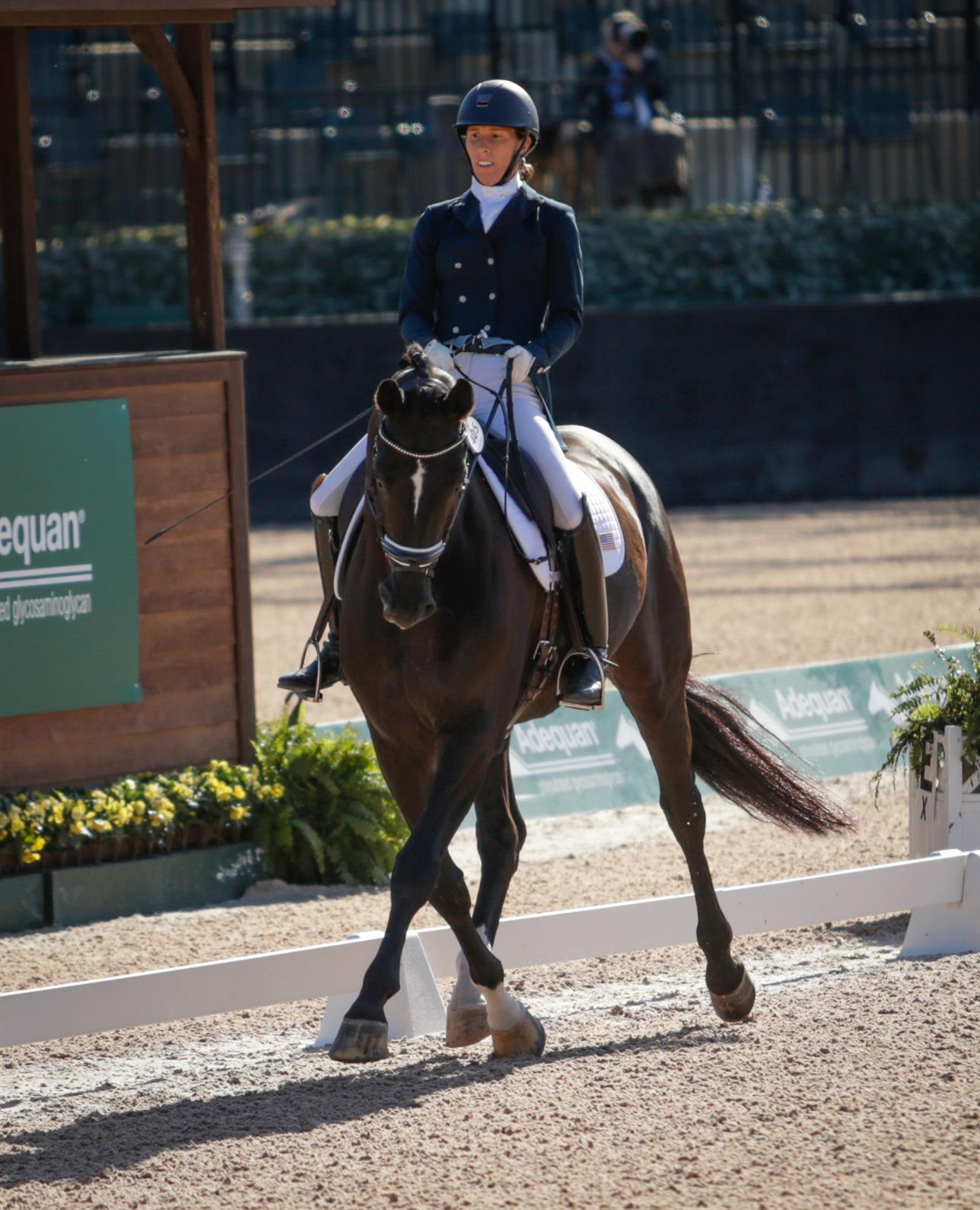
The U.S. team was counting on the experience of veteran combination Shoemaker and her and Craig and Deena Shoemaker’s 11-year-old Hanoverian stallion, Solitaer 40. This pair did not disappoint, winning their grade with a 71.341 percent.
“I really liked how consistent he was throughout the test,” said Shoemaker. “There was never a moment where I thought ‘Oh gosh, that wasn’t okay.’ It was great, and he stayed with me the whole time.”
Last in the ring for the U.S. team was Jackson and her new 15-year-old Oldenburg gelding Diesel. In Diesel’s very first CPEDI, the combination won their grade with a score of 69.405 percent.
“It has been a bit of a whirlwind,” said Jackson. “We have been together with the focus of coming here for the test event for only a month and [I’ve only been] riding him for about eight weeks, but Diesel is just an incredible horse. He understood my aids from the very beginning. He didn’t get nervous, he just said, ‘Okay, let’s do this.’ He is such a hard worker and what a good boy.”
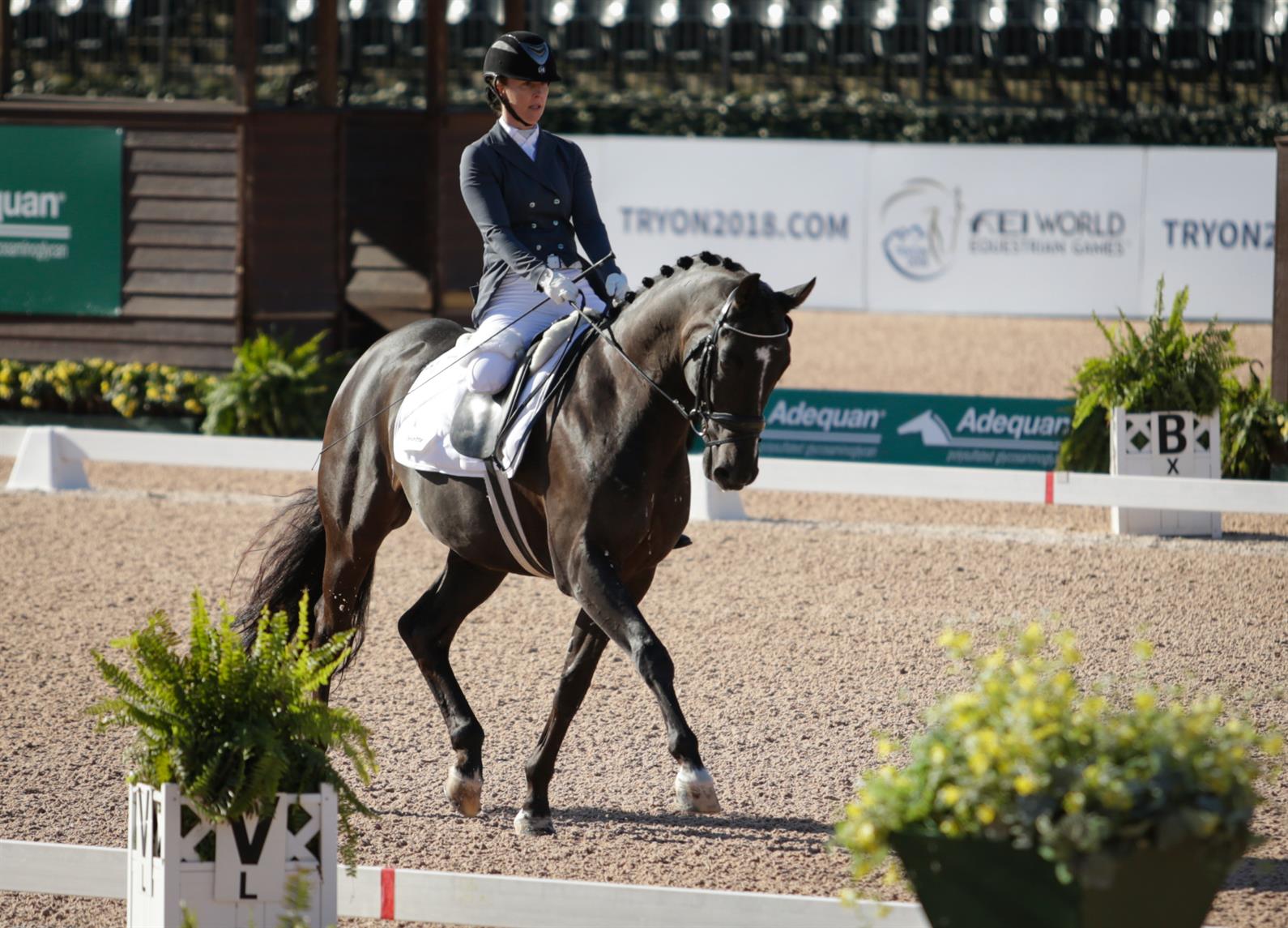
“[I want to] thank Diesel’s previous owner, Rowan O’Riley, and what she has done for all of us as para-equestrians and the sport, as a supporter,” continued Jackson. “Her generosity in making the ownership of Diesel possible is just incredible. And, to Catherine Haddad-Staller, my coach, for embracing para-dressage and just stepping in and taking the reins – it has been a blast. Grateful to both of them and the team that has formed around me.”
On Saturday morning, the U.S. team contested the FEI Team Test, beginning with Grade V and ending with Grade I. Jackson and Diesel were first in the ring for the U.S. team, winning Grade V with a score of 68.760 percent. Shoemaker and Solitaer 40 took second in Grade IV on a 68.542 percent, while Hart and Fortune 500 won the Grade III with an improved score of 71.569 percent. Trunnell and Dolton rode last for the U.S. team, again winning the Grade I with an improved 74.345 percent.
The U.S. athletes will contest the FEI Freestyle Test as individuals on Sunday, beginning with Grade I at 11:00 a.m. EST.
U.S. Para-Dressage Looks Ahead to the WEG
Serving as the test event in preparation for the WEG, the Tryon Para-Dressage Test Event CPEDI3* gave the U.S. para-equestrian dressage athletes the opportunity to familiarize themselves with not just the arena, but the pathways, barns, and facility as a whole.
“[This event] gives us another insight into how the horses will perform at this venue,” said Handt. “We pretty much mimicked the entire WEG event out here this week – we are running a WEG format. It is a very good thing for [the athletes] to do because it is a different format – individual test first, then the team test, and then the freestyle. So they will get used to that. “
“We have a very good show manager here in Thomas Bauer,” continues Handt. “He understands para-equestrian and this organization does a tremendous job with para – they are very good about the management for the para-riders. They really bend over backwards to make it as convenient as they can to get the para-athletes in and out.”
As the U.S. para-equestrian dressage team looks forward to the WEG, they will host a training camp in the beginning of July that will focus on a top group of potential athletes for the Games. At this camp, they will potentially ride a mock-event and the selectors will closely examine the performance of the combinations. In the meantime, Handt and Assouline, as well as their support staff, will continue to be in contact with the trainers and coaches of the para-equestrian dressage athletes, assisting them in their preparation.
“Right now, we are conferring with the trainers and coaches a lot,” continues Handt. “There is also a lot of feedback from this show on their rides happening here so that it instantly sets in. But there is constant contact with the individual coaches, and we are doing more seminars to help get these riders trained.”
“It is not all about international shows, but focusing on their progress and training at home,” said Assouline. “From now on, it is focusing on what we have learned. Coming here, it was focusing on learning the differences between the horses and seeing the pros and cons of each horse, and then learning from that and adjusting.”
Learn more about the selection procedures for the U.S. Para-Equestrian Dressage Team presented by Deloitte for the WEG at Tryon 2018.
The USEF International High Performance Programs are generously supported by the USET Foundation, USOC, and USEF Sponsors and Members.


